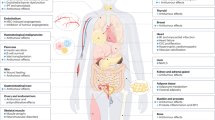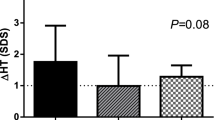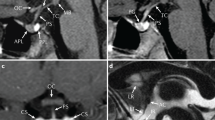Abstract
ABSTRACT: To determine whether differential response to growth hormone-releasing hormone (GHRH) could cause the developmental changes seen in growth hormone (GH) secretion, we administered 10 µg/kg GHRH (1-44 NH2) to a group of four unanesthetized, fasted, rhesus monkeys via acutely placed venous catheters at 1, 7, 14, and 28 d postnatal age. Serum GH was assayed by hGH RIA in sera collected at -60, -30, 0, 15, 30, 45, 60, and 90 min relative to the GHRH bolus. Serum cortisol was measured by ELISA in the 0-, 30-, and 60-min samples. Differences between age groups were analyzed by repeated measures analysis of variance and paired t tests. Mean basal GH levels were higher at 1 d (9.4 ± 1.2 µg/L, mean ± SEM) than at 7 (5.5 ± 0.4), 14 (5.6 ± 0.5), and 28 d (5.3 ± 0.5) of age. There were no other significant differences in mean basal δGH values between the age groups. Mean post-GHRH GH concentrations decreased significantly with each age after 1 d (22.6 ± 1.6): 7 d (16.4 ± 1.3); 14 d (11.3 ± 1.0); and 28 d (7.9 ± 0.9). Similarly, mean δ GH values decreased with each increase in age from 1 d (15.0 ± 1.9): 7 d (10.9 ± 1.6); 14 d (5.9 ± 1.1); and 28 d (2.7 ± 0.8). Serum cortisol was not correlated with serum GH at any age. Our study demonstrates decreasing basal GH concentration and GH responses to GHRH with advancing age from 1 to 28 d in the rhesus monkey. The spontaneous decline in GH concentration observed during the first few days of life may reflect a decrease in pituitary gland response to GHRH stimulation.
Similar content being viewed by others
Log in or create a free account to read this content
Gain free access to this article, as well as selected content from this journal and more on nature.com
or
Author information
Authors and Affiliations
Rights and permissions
About this article
Cite this article
Wheeler, M., Styne, D. Longitudinal Changes in Growth Hormone Response to Growth Hormone-Releasing Hormone in Neonatal Rhesus Monkeys. Pediatr Res 28, 15–16 (1990). https://doi.org/10.1203/00006450-199007000-00004
Received:
Accepted:
Issue date:
DOI: https://doi.org/10.1203/00006450-199007000-00004



